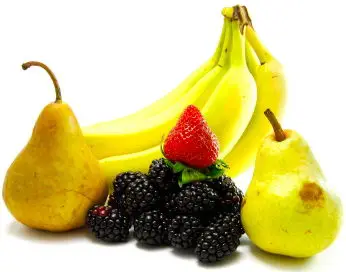Potassium is an electrolyte, a mineral salt that together with sodium and chlorine produces electricity in the cells.
It is important for the heart and plays a key role in muscle contraction.
Lack of potassium affects muscles directly and manifests as muscle pain. Eating foods high in potassium will ease the pain.
Navigation:
Potassium rich foods
How much potassium per day?
Symptoms and effects of lack of potassium
Consuming too much of potassium
Bone health and potassium
Foods that are naturally high in potassium
Modern-man diet is often unhealthy and poor in potassium. Lack of potassium may result in high blood pressure – high potassium intake can help loosen blood vessels and excrete the sodium and therefore efficiently decrease blood pressure.
Lack of potassium may also cause frequent muscle spasms and even cardiovascular disease (high blood pressure is a leading cause of cardiovascular disease).
There are plenty of foods rich in potassium available in your local superstore. These are meat, certain fish (salmon, cod), different fruits (bananas, avocados), vegetables (potato, tomato) and legumes. Milk (and other dairy products) are also a good source of potassium!
Below you can find a list of some of the most potassium rich foods.
| vegetables | fruit | meat and fish | diary | plants and herbs |
|---|---|---|---|---|
| garlic | banana | beef | milk | fennel |
| lettuce | carrot | pork | yogurth | savory |
| beetroot | raisins | seafood | cheese | coriander |
| chard | prunes | salmon | cottage cheese | tarragon |
| sprouts | figs | cod | soy milk | oregano |
| kohlrabi | avocado | chicken | low fat milk | cumin |
| salad rocket | kiwi | turkey | sour milk | parsley |
| pumpkins | nectarine | halibut | ||
| parsley | peach | trout | ||
| tomatoes | orange | tuna | ||
| eggplant | grapes | clams |
How much potassium per day?
If your diet is diverse (as it should be) you are most likely getting sufficient dosage of potassium.
In case you lack potassium you should consider adding more of the above mentioned foods to your menu.
Daily potassium allowance:
| age | how much potassium [grams] | how much potassium [ounce] |
|---|---|---|
| Infants up to 6 months | 400 mg / day | 0.014 oz / day |
| Infants older than 7 months | 700 mg / day | 0.02 oz / day |
| Children 1-3 years | 3 g / day | 0.1 oz / day |
| Children 4-8 years | 3.8 g / day | 0.13 oz / day |
| Children 9-13 years | 4.5 g / day | 0.15 oz / day |
| Adults 19 years and older | 4.7 g/ day | 0.16 oz / day |
| Elderly | 4.7 g/ day | 0.16 oz / day |
| Pregnant women | 4.7 g / day | 0.16 oz / day |
| Women who are breastfeeding | 5.1 g / day | 0.18 oz / day |
Source: http://umm.edu/health/medical/altmed/supplement/potassium
Please note that recommendations for different countries might differ.
Lack of potassium
Lack of potassium is also known as hypokalemia. Symptoms of hypokalemia are the following:
Your body usually lacks potassium after it lost a lot of fluid (excessive urination and / or diarrhea). Hypokalemia may be associated with the use of certain drugs or might occur as a result of a wrong diet that is poor in potassium and rich in sodium.
Studies have shown that low-level of potassium in your blood is directly correlated with high blood pressure level. It was also proven that an increased potassium intake can slightly lower your blood pressure and reduce the risk of death from cardiovascular disease.

Foods that are high in potassium are fruits like banana and avocado, different types of meat and dairy products.
Patients with ulcerative colitis (a type of inflammatory bowel disease), or suffer from Crohn’s disease (a type of inflammatory bowel disease) often have problems with the absorption of nutrients – they also often have problems with low levels of potassium and other important nutrients. If you have such kind of health problems your doctor can prescribe you with potassium additive (after your blood is properly examined).
What happens if you consume too much potassium?
The condition when potassium levels are too high is also know as hyperkalemia. Too much sodium (eating a lots of food that contains too much salt – which is a problem in modern diet) may increase the need for potassium.
If there is an excess level of potassium present in your body than this may cause nausea, diarrhea, vomiting and ulcers.
In older people and people with kidney problems the risk of hyperkalemia is higher because the kidneys are unable to flush out that extra potassium. This may ultimately lead to death.
Potassium and bones
Some studies have shown the positive impact of diets high in potassium on overall bone health and structure. Consuming foods high in potassium play an important role in the prevention of stroke and osteoporosis for women.








































![The 123 of Coca-Cola [Infographic] crushed coca cola can](https://healthiack.com/wp-content/uploads/2015/05/crushed_coca_cola_can-100x70.jpg)

[…] This fruit is rich in vitamin C, fibers, vitamin A, magnesium, folate, and potassium. […]